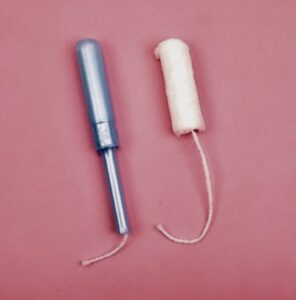If you have a heavy period, it's more than just a drag. It can make you live in fear, always searching for the nearest bathroom, armed with spare clothes in case of leaks. That was the case for Tamika Warren-Jenkins, an Indianapolis woman who suffered from a heavy menstrual cycle for years, without realizing fibroids were to blame.

Some women are more at risk for heavy flow than others. And there’s lots of reasons your period gets heavy (we’ll go through them shortly. Because it’s important to know your why, so you can determine if you need to seek medical care.) But first, let’s talk about Tamika's experience, and what it means to have a ‘heavy’ period.
While Takima's mom and three aunts all had fibroids, she says it wasn't something the family talked about. So, when Tamika started experiencing debilitating symptoms such as heavy periods, she didn't immediately suspect fibroids.
By 2017, she told WishTV, she knew these non-cancerous tumors were responsible. But, instead of reviewing all her treatment options, her doctor suggested dropping extra weight to lower her estrogen levels. (While we don't know what causes fibroids, high hormonal levels may contribute to their growth and development.)
Desperate for relief, Tamika says, "I put in the work. Because the first thing they said was less hormones, less estrogen. So if it’s less estrogen in your body, then they shouldn’t grow as fast. They should shrink. That was the thought at the time, but it didn’t happen that way.” Even though she dropped an incredible 85 pounds!
Even after her weight transformation, Tamika found no relief from heavy periods. So, since she already had two children, and didn't want more, she opted to treat her fibroids with a hysterectomy.
Ultimately, this decision was the right one for Tamika, who says she's now living symptom-free. But not every woman needs to lose her uterus to find fibroid relief. And that's why Tamika wants everyone to know her story. She says, "I know reproductive health is like, ugh, I don’t want to talk about that, but you do need to talk about it.” Which is why she's our Woman Crush of the Week. And why we want you to read all about why Tamika, and other women, might be at higher risk for heavy periods.
Any woman, especially Black woman, with an increased fibroid risk is more likely to have a heavy period. In fact, about 39% of black women experience heavy bleeding at that time of the month. (And 70% of black women will likely develop fibroids.)
But fibroids aren't the only condition that can affect your monthly flow. If you have PCOS (Polycystic Ovary Syndrome), your periods will probably be irregular. Still, when they do come, they are likely to be heavier than normal.
Also, women who are obese (with a BMI that's 30 or higher), and women with copper IUDs have a higher risk for heavy periods. Finally, thyroid conditions, as well as health conditions that put you on blood thinners, could also leave you with a heavy flow each month.
Of course, sometimes a heavy period is no big deal. But sometimes, heavy flow can negatively impact other areas of your help. So keep reading to find out if you need medical help for your heavy period.

Like everything to do with your body, some of this is personal. If your period is suddenly much heavier than it used to be (you’re soaking through tampons or pads more rapidly), that on its own could be a warning sign.
But there is a medical condition, known as menorrhagia, which refers to a possibly-dangerous amount of period blood loss. Signs of this condition include soaking your tampon or pad every hour, for several hours in a row. Or, if you need to use a tampon and pad to avoid leaking, you may have a problem. It’s also problematic if your period lasts longer than a week, if you pass clots that are bigger than a quarter, or if your flow is affecting your sleep and daily activities.
There are several reasons your period might be heavy. Let’s explore a few, and discuss what to do if you think that’s your ‘why.’
Fibroids are (almost always) non-cancerous tumors that develop in, on or around your uterus. Fibroids cause heavy and long periods. But that’s not the only symptom that pops up with fibroids. If your heavy periods are the result of fibroids, you may have other symptoms like pelvic pain, constipation, frequent urination, and even bloating or weight gain (larger fibroids can make you look like you’re in the early stages of pregnancy!)
If you experience heavy periods, and any of the other fibroid symptoms we described, call your gynecologist or a fibroid specialist for a screening.
Your thyroid actually plays a role in regulating your menstrual cycle, so when it’s malfunctioning, your period could stop completely. Or it could get really heavy. Typically, heavy periods are a sign of an underactive thyroid because this can impact your ovaries progesterone production, and that’s the hormone which regulates your period flow.
If an underactive thyroid is causing your heavy periods, you may also experience fatigue, dry skin, brittle nails and hair loss. Got these symptoms too? It’s best to seek the advice of an endocrinologist regarding your thyroid help.
In the years and months before menopause, your period will change. It won’t come as often, and it could last longer, and be heavier when it does show up.
Since your period is coming less frequently, your uterine lining will get thicker before it sheds. This means when it does arrive, your period will be much heavier. You may also pass more and larger clots. So, if you’re approaching the age of menopause, and your period’s getting heavier, you don’t need to be concerned. Instead, acknowledge your changing body and start preparing mentally for your next stage of life.

Are you using the pandemic to become a crazy runner? Or taking online fitness classes every single day? When you suddenly ramp up your activity levels, your adjusting body may lose its hormonal balance. As a result, your periods may get heavier. And this heavy flow could last for a few cycles, especially if you keep upping your fitness game.
If you’ve been training extra hard during the pandemic, and now your flow is off, you probably don’t need to go into your doctor’s office. You may, however, want to discuss hormone-balancing measures you could take from home. And possibly build a rest day into your schedule!
There are other factors which make your periods more likely to be painful. These include your age (periods tend to be more painful before you turn 20), and your pregnancy history (if you haven't had a baby, painful periods are more likely.) If you're a smoker, or have a family history of painful periods, your risk is also higher.
Another factor to consider is when you started your period. If your first menstrual cycle arrived before you turned 11, this could increase your risk for period pain. And, finally, aside from fibroids, other chronic conditions can make your period more painful. These include Premenstrual syndrome (PMS), which is a condition triggered by the hormonal changes in your body that begin 1 to 2 weeks before your period. Endometriosis could also be responsible. This is a condition in which your uterine cells grow outside of the uterus, typically on your ovaries, fallopian tubes, or even on your pelvic lining.
Now you know some possible causes for your heavy, painful periods, it’s time to start looking carefully at all of your menstrual symptoms. And please know that, even in these crazy times, we are here to help you find relief from period pain. Houston fibroids is open and here for you!
Sources: International Journal of Obstetrics and Gynecology, Prevention Magazine, Oprah Magazine
As leading fibroid specialists in Houston, we can help you get back to doing the things you love – free of pain and symptoms associated with this diagnosis.

Scheduling
Please contact our dedicated specialists to schedule a consultation today.
2025 Houston Fibroids. All rights reserved. Website Design by Healthcare Success